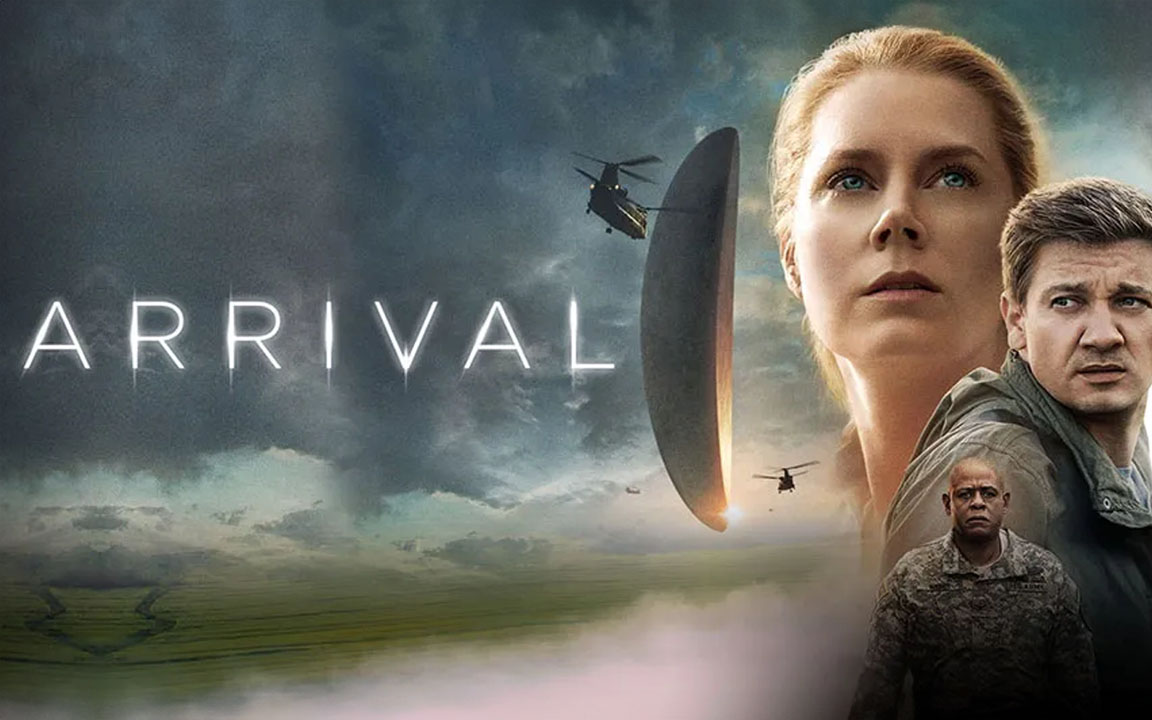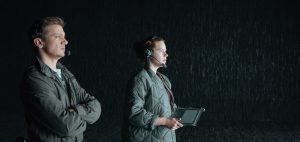Arrival (2016)
- fanmovies
- October 23, 2024

Arrival (2016) – Movie Review
Arrival, directed by Denis Villeneuve, is a cerebral and emotionally resonant science fiction film that offers a fresh perspective on the alien contact genre. Based on Ted Chiang’s short story Story of Your Life, the film delves into themes of communication, time, and humanity, while delivering a deeply emotional and thought-provoking narrative. It stars Amy Adams, Jeremy Renner, and Forest Whitaker, and is a standout in Villeneuve’s body of work due to its intelligent storytelling and unique approach to sci-fi.
Plot Overview:
The film begins with the sudden appearance of 12 mysterious alien spacecraft in various locations across the globe. Each nation scrambles to understand the intentions of these extraterrestrial visitors, and the U.S. government enlists the help of Dr. Louise Banks (Amy Adams), a linguistics expert, to try and communicate with the aliens. Alongside physicist Ian Donnelly (Jeremy Renner), Louise works to decipher the alien language and understand why they have come to Earth.
The aliens, known as Heptapods, communicate through complex circular symbols, and as Louise gets deeper into the process of decoding their language, she begins to experience visions that seem to challenge her perception of time. What unfolds is not just a story about first contact but also a meditation on how language shapes our understanding of reality and the choices we make.
Themes and Philosophical Depth:
One of the most compelling aspects of Arrival is its exploration of language and communication. The film presents language as more than just a means of conveying information—it’s a tool that shapes thought and perception. As Louise learns the alien language, she begins to see time differently, experiencing events from both the past and future simultaneously. This raises deep philosophical questions about free will, destiny, and the nature of time itself.
The film also touches on the importance of cooperation and understanding in the face of fear. The global response to the alien arrival reflects humanity’s tendency toward distrust and aggression, but Louise’s journey emphasizes the power of empathy and communication in bridging seemingly insurmountable divides. The movie’s message about the importance of communication is especially timely in a world where division and fear often dominate discourse.
Performances:
- Amy Adams (Dr. Louise Banks): Amy Adams delivers a nuanced and powerful performance as Louise Banks. Her portrayal of a woman grappling with grief, uncertainty, and the weight of her discoveries is central to the emotional impact of the film. Adams brings a quiet strength and vulnerability to the role, making Louise both relatable and heroic in her own understated way. Her character’s arc is deeply moving, particularly as the film reveals more about her personal journey and the visions she experiences.
- Jeremy Renner (Ian Donnelly): Renner provides solid support as Ian, the physicist who works alongside Louise. While his role is more technical and grounded compared to Louise’s emotional and philosophical journey, Renner brings a likable and charming presence to the film. His chemistry with Adams adds warmth to the story.
- Forest Whitaker (Colonel Weber): Whitaker plays the no-nonsense military leader overseeing the operation. While his role is more functional, serving as a bridge between the scientific and military aspects of the story, Whitaker’s performance lends gravitas to the film.
Visuals and Cinematography:
Visually, Arrival is stunning in its simplicity. The design of the alien spacecraft is striking yet minimalistic—monolithic, black, and hovering ominously over the Earth. The interior of the ships, where Louise and Ian communicate with the Heptapods, is equally stark, creating a sense of mystery and otherworldliness.
Cinematographer Bradford Young uses a subdued color palette, often favoring muted tones and natural light to create an intimate and grounded atmosphere. This contrasts beautifully with the otherworldly elements of the alien encounters, giving the film a sense of realism despite its fantastical premise. The cinematography adds to the film’s contemplative tone, making the visuals feel both vast and intimate at the same time.
Music and Sound:
The haunting and evocative score by Jóhann Jóhannsson is another standout element of the film. The music complements the film’s mood perfectly, blending ambient soundscapes with emotional swells that heighten the tension and emotional weight of the story. The use of silence is also particularly effective, emphasizing the sense of isolation and awe experienced by the characters as they encounter the unknown.
The sound design for the Heptapod language is equally impressive. Their deep, resonant vocalizations and the visual representation of their written language add to the alien mystique, making their form of communication feel truly otherworldly yet decipherable.
Themes of Time and Choice:
At its heart, Arrival is about the relationship between time, memory, and choice. As Louise learns the Heptapod language, she begins to experience time in a non-linear way, seeing her future as vividly as her past. This revelation adds emotional depth to the story, as the film poses a poignant question: if you knew the future—particularly your moments of happiness and grief—would you make the same choices?
This theme is most clearly represented through Louise’s personal story, as her visions reveal intimate details about her life. The film’s exploration of this concept is both heart-wrenching and thought-provoking, offering a meditation on life, love, and the inevitability of loss. It’s a deeply emotional aspect of the film that resonates long after the credits roll.
Strengths:
- Innovative Storytelling: The film’s non-linear narrative and focus on language as a way to perceive time offers a fresh and intellectually stimulating approach to the sci-fi genre.
- Emotional Depth: The film’s exploration of grief, memory, and choice adds emotional weight to the story. Amy Adams’ performance as a grieving mother and brilliant linguist makes the film’s themes hit home on a personal level.
- Strong Direction and Cinematography: Denis Villeneuve’s restrained and masterful direction, combined with Bradford Young’s stunning cinematography, creates a visually captivating experience that complements the film’s philosophical depth.
- Soundtrack and Sound Design: Jóhann Jóhannsson’s haunting score and the alien sound design are integral to the film’s atmosphere, heightening both the tension and the emotional resonance.

Weaknesses:
- Slow Pacing: The film’s deliberate pacing may not appeal to viewers expecting a traditional alien invasion or action-packed sci-fi film. Arrival is more meditative and introspective, focusing on ideas and emotions rather than spectacle.
- Complexity of Concepts: Some viewers might find the film’s exploration of time, language, and communication challenging to follow, particularly in the latter half of the film where the plot’s complexities come to the forefront.
Final Thoughts:
Arrival is a rare sci-fi film that successfully combines intellectual ideas with deep emotional storytelling. It’s not just a film about aliens and first contact; it’s a film about communication, the choices we make, and how we perceive time and memory. With strong performances, especially from Amy Adams, and a unique approach to its subject matter, Arrival stands out as one of the most thoughtful and emotionally resonant science fiction films of the past decade.
For fans of sci-fi that prioritizes thought-provoking themes over action, Arrival is a must-see film that will leave you reflecting on its ideas long after the credits roll.
Suggested Video for You: If you enjoyed Arrival, you might appreciate Interstellar (2014), which also explores themes of time, space, and the emotional connections between people, combining mind-bending science fiction concepts with human stories of love and sacrifice.











